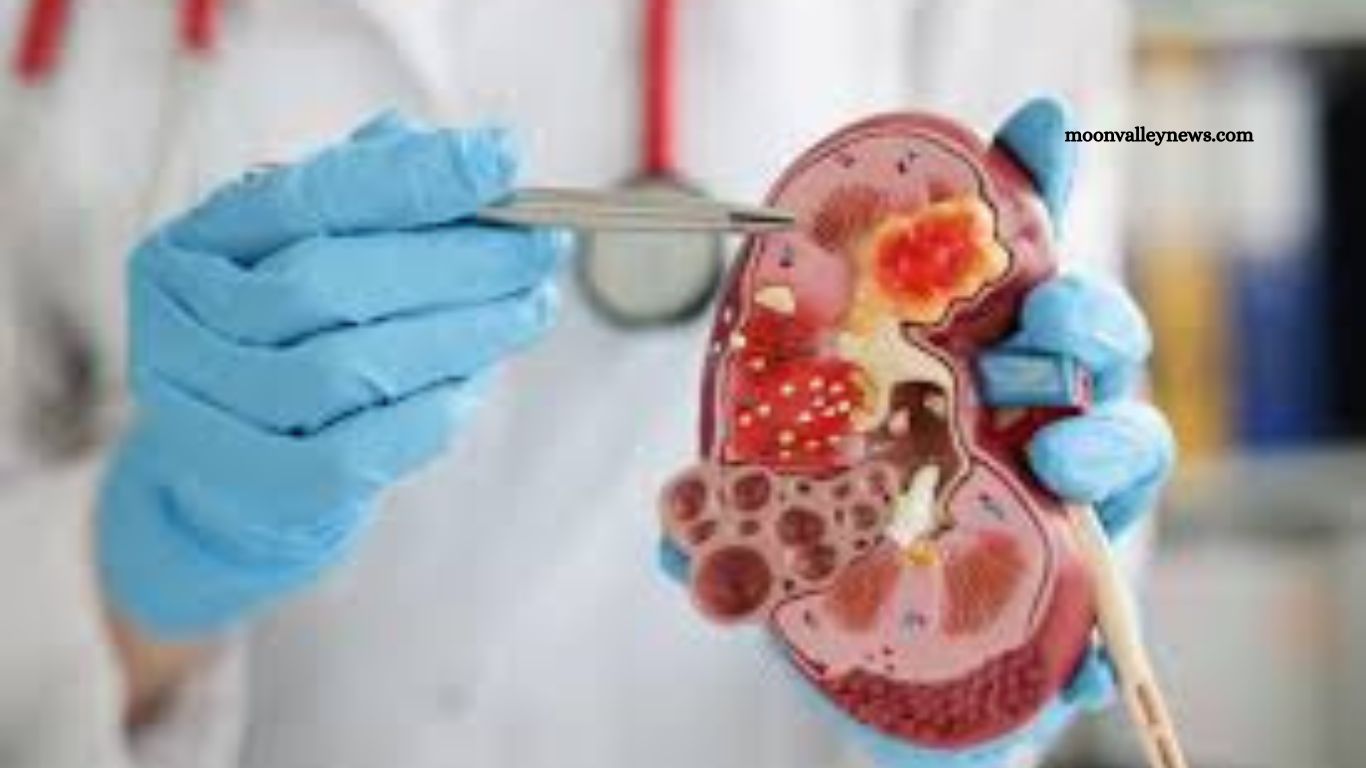Kidney cancer often develops silently, with few noticeable symptoms in its early stages. However, recognizing potential warning signs early can make a significant difference in treatment outcomes. Common symptoms may include blood in the urine, persistent back or side pain, unexplained weight loss, and fatigue.
While these signs can be linked to other conditions, it’s important not to ignore them. This guide will help you understand the key symptoms of kidney cancer and what steps to take if you notice them. From seeking medical advice to understanding diagnostic tests and treatment options, knowing what to do next can empower you to take control of your health and seek timely care. Early detection is crucial—your awareness could save a life.
Read More: Delta to Roll Out AI-Driven Dynamic Ticket Pricing Nationwide by Late 2025
- Kidney cancer often shows no obvious symptoms in its early stages. Signs like blood in the urine or lower back pain usually emerge as the tumor grows.
- Risk factors such as age, smoking, obesity, high blood pressure, and certain genetic conditions can raise the chance of developing kidney cancer.
- Experiencing possible symptoms warrants prompt medical evaluation, as early diagnosis can lead to better treatment outcomes.
What Are the Symptoms of Kidney Cancer?
Kidney cancer, or renal cell carcinoma (RCC), ranks among the top 10 most common cancers in adults. It’s most often diagnosed in people over 60, typically discovered incidentally during routine imaging tests.
The kidneys are two fist-sized, bean-shaped organs located beneath the rib cage. They play vital roles in filtering waste from the blood, producing urine, regulating blood pressure, and supporting red blood cell production. Although the body can function with just one kidney, a tumor in either organ can interfere with these essential processes.
Kidney cancer symptoms usually don’t appear in the early stages. When they do emerge, they often involve changes in urination or discomfort in the lower back area.
Blood in the Urine (Hematuria)
Hematuria—blood in the urine—is the most common symptom of kidney cancer. Even a small amount of blood can cause noticeable changes in urine color, which may appear:
- Pink
- Reddish
- Brownish
The presence of blood may be inconsistent, sometimes showing up every other day. In some cases, the amount is so minimal that it’s only detectable through a urinalysis.
While hematuria can be a sign of kidney cancer, it may also result from other conditions, such as:
- Kidney or bladder infections
- Kidney stones
- Kidney cysts
- Kidney injuries
If you notice any blood in your urine—regardless of the amount—it’s important to consult a doctor or healthcare provider promptly.
Lower Back Pain
While back pain is common in people over 40—often due to muscle strain or spinal issues—it can also be a symptom of kidney cancer. However, this type of pain usually doesn’t appear until the cancer has progressed to a later stage.
Kidney cancer-related back pain can vary in intensity and feel. You may experience:
- A dull ache below the ribcage or on one side of the flank (the area between your lower back and the bottom of your ribs)
- A sharp or stabbing pain in the same region
- Pain localized to one side
- A sensation of pressure instead of pain
If you have sudden or persistent back pain lasting more than a few days—especially with other symptoms—it’s important to speak with a doctor. Sharing all your symptoms helps guide a more accurate diagnosis.
A Mass or Lump Around Your Abdomen
A lump or mass in the abdomen, side, or lower back can be a sign of kidney cancer. It may feel like a firm thickening or a bulging bump beneath the skin.
However, kidney tumors are often difficult to detect by touch—especially in the early stages—because the kidneys are located deep within the abdominal cavity. Many people won’t feel or notice a lump until the tumor has grown significantly.
If you do find a lump, your doctor will likely order imaging tests, such as an ultrasound or CT scan, to learn more. A biopsy may be needed to confirm whether the lump is cancerous.
Keep in mind: not all abdominal lumps are cancer. If you notice one, it’s important to get it checked by a healthcare provider.
Fatigue
Fatigue is a common symptom across many types of cancer, including kidney cancer. According to a 2020 research review, nearly half of people with cancer report experiencing fatigue—especially during treatment.
Unlike typical tiredness from poor sleep or a busy schedule, cancer-related fatigue is persistent, doesn’t improve with rest, and can significantly interfere with daily life. It often worsens over time.
Anemia
Anemia, or a low red blood cell count, is another potential sign of kidney cancer. Normally, healthy kidneys produce a hormone that signals the body to create red blood cells. When cancer disrupts this process, anemia can result.
Anemia-related symptoms may include:
- Persistent fatigue
- Shortness of breath
- Dizziness
- Pale or washed-out skin
If you’re feeling unusually tired or lightheaded, it’s important to speak with a healthcare provider for testing and diagnosis.
Appetite Loss
Loss of appetite can be caused by various conditions, including cancer. In kidney cancer, tumors may affect how your body regulates digestion or hormone levels, leading to a sudden disinterest in food.
If you experience unexplained appetite loss that doesn’t improve, consult a doctor. Identifying the underlying cause early can help guide effective treatment.
Unexpected Weight Loss
Unintentional weight loss is a common symptom of kidney cancer. It often occurs even when a person isn’t trying to lose weight and may be accompanied by appetite loss. As the cancer advances and spreads to other organs, the body may burn energy differently, leading to rapid or noticeable weight loss.
Fever
While a fever alone isn’t usually a strong indicator of kidney cancer, recurring or unexplained fevers can be a symptom. These fevers aren’t typically linked to infections and may come and go or linger without a clear cause. If you experience a persistent fever without signs of illness, it’s worth discussing with a healthcare provider.
Swelling in the Legs and Ankles
Swelling—also called edema—in the legs, ankles, feet, or even hands can result from kidney cancer. Healthy kidneys help regulate fluid balance in the body. When cancer interferes with kidney function, fluid can build up in tissues, leading to visible puffiness or swelling in the lower extremities.
Are There Early Warning Signs of Kidney Cancer?
In many cases, kidney cancer doesn’t cause noticeable symptoms in its early stages. In fact, research shows that over half of people diagnosed with renal cell carcinoma (RCC) have no symptoms at the time of diagnosis. Often, the cancer is discovered incidentally during imaging tests for other conditions.
Still, some early warning signs can appear, including:
- Blood in the urine (hematuria)
- Fatigue caused by anemia
- Loss of appetite
- Unexplained weight loss
If you’ve been feeling generally unwell, it’s important to see a doctor—especially if:
- Your fatigue or illness lasts more than two weeks
- Your symptoms are worsening over time
Early evaluation and diagnosis can lead to better treatment options and outcomes.
Who’s at Risk of Kidney Cancer — and How Can It Be Prevented?
Certain people have a higher risk of developing kidney cancer due to age, lifestyle choices, medical conditions, or genetic factors. Understanding your risk can help you take steps toward prevention or early detection.
Common Risk Factors:
- Age – Risk increases as you get older, especially after age 60
- Smoking – Tobacco use significantly raises your risk
- Obesity – Excess body weight is linked to higher cancer risk
- High blood pressure – Chronic hypertension is a known risk factor
- Kidney failure treatment – Long-term dialysis can increase risk
- Gender – Men are more likely than women to develop kidney cancer
- Genetics – A family history of kidney cancer may increase your risk
Genetic or Hereditary Conditions Linked to Kidney Cancer:
- Von Hippel-Lindau disease
- Hereditary papillary renal cell carcinoma
- Birt-Hogg-Dubé (BHD) syndrome
- Hereditary leiomyoma-renal cell carcinoma
- Tuberous sclerosis
- Cowden syndrome
How to Lower Your Risk:
- Manage high blood pressure with healthy habits and medication
- Eat a balanced diet rich in fruits, vegetables, and whole grains
- Exercise regularly if you’re physically able
- Avoid smoking and other tobacco products
- Use acetaminophen safely, following recommended doses
- Limit exposure to harmful chemicals like trichloroethylene
- Inform your doctor if you have a personal or family history of cancer
Taking control of these lifestyle and environmental factors can help reduce your overall risk. If you’re concerned about your risk level, speak with your healthcare provider about screening or genetic counseling.
What Happens Next?
If you’ve experienced any symptoms of kidney cancer—especially alongside known risk factors—it’s important to schedule an appointment with a doctor or healthcare professional as soon as possible. Early evaluation can lead to quicker diagnosis and potentially more effective treatment.
Here’s what typically happens during the diagnostic process:
Medical Tests
Your doctor may order several tests to help identify the cause of your symptoms, including:
- Urinalysis and urine culture – to check for blood, infection, or abnormalities
- Blood tests – to evaluate for anemia and assess kidney, liver, and metabolic function
Physical Examination
A physical exam may be done to feel for a lump or mass in the abdomen. However, kidney tumors are often too deep to detect unless they’re quite large.
Imaging Tests
If a mass is suspected, imaging tests are often recommended, such as:
- Ultrasound
- CT scan (computed tomography)
- MRI (magnetic resonance imaging)
These provide detailed visuals of the kidneys and surrounding structures.
Biopsy
If imaging reveals a suspicious mass, a biopsy may be needed to confirm whether it’s cancerous. This involves taking a small tissue sample for lab analysis.
While many symptoms of kidney cancer can also occur with less serious conditions, it’s important not to ignore them. Prompt evaluation and diagnosis increase the likelihood of successful treatment and a better long-term outcome.
Frequently Asked Questions
What are the early signs of kidney cancer?
Early signs can be subtle or absent. When present, they may include blood in the urine, fatigue, loss of appetite, unexplained weight loss, or a persistent dull pain in the lower back or side.
Is back pain always a symptom of kidney cancer?
No. Back pain is common and often caused by muscle strain or spinal issues. Kidney cancer-related pain is usually persistent, one-sided, and occurs later in the disease.
Can kidney cancer be found during a routine checkup?
Yes. Many cases are discovered accidentally during imaging tests (like ultrasounds or CT scans) done for unrelated reasons.
Who is most at risk for kidney cancer?
People over age 60, smokers, men, those with high blood pressure, obesity, kidney failure, or certain inherited conditions have a higher risk.
Can kidney cancer be prevented?
While not all cases can be prevented, you can lower your risk by avoiding smoking, maintaining a healthy weight, managing blood pressure, staying physically active, and limiting exposure to harmful chemicals.
What should I do if I see blood in my urine?
Even if it happens only once, blood in the urine (hematuria) should always be evaluated by a doctor. It may indicate kidney cancer or another condition like an infection or kidney stones.
Conclusion
Kidney cancer often develops quietly, with few symptoms in its early stages. That’s why awareness of potential warning signs—such as blood in the urine, unexplained fatigue, or lower back pain—is so important. While these symptoms can be caused by other conditions, they should never be ignored.
Knowing your risk factors, staying informed, and seeking medical attention when something feels off can make a critical difference in early detection and treatment success. If you’re experiencing any concerning symptoms or have a family history of kidney cancer, don’t wait—speak with a healthcare provider.







